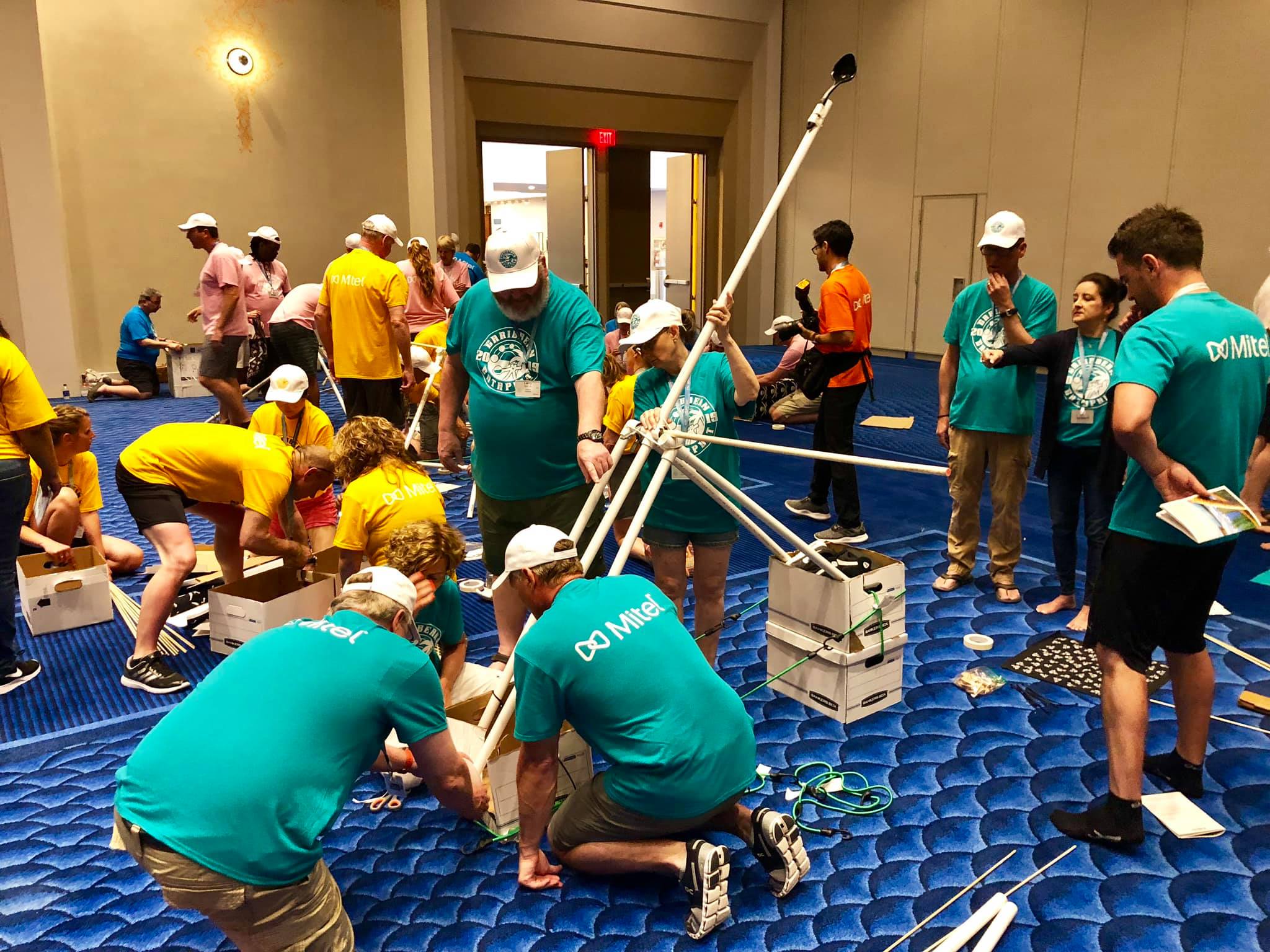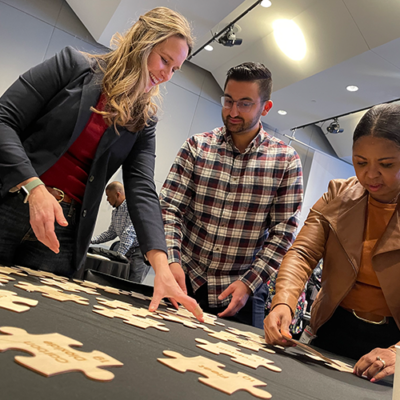The ownership mindset is something that you may not have heard of, but it plays a huge role in team success. Having an ownership mindset is about taking ownership and responsibility of your business, the decisions you make, and the outcomes of those decisions. With the right mindset, you and your team can reach new heights and work better than ever.
In our most recent episode of the Team Building Saves the World podcast, we talked to Lia Garvin—bestselling author of Unstuck, TEDx speaker, host of the top 20 podcast Managing Made Simple, and organizational effectiveness consultant with experience leading team operations across Google, Microsoft, Apple, and Bank of America.
During our interview, she emphasized the importance of an ownership mindset and the impact it can have, saying, “I’ve noticed when teams have a sense of ownership, they’re proactive when problems come up; they’re not pointing fingers, and they’re not looking for someone else to solve things.”
In this article, we’re going to take a closer look at the ownership mindset, what benefits it offers, how to develop an ownership mindset, and how to overcome the challenges associated with implementing an ownership mindset.
Benefits of an Ownership Mindset for Teams
An ownership mindset can have numerous benefits for your teams, ranging from individual benefits to benefits that can impact your whole organization. Let’s take a closer look at those benefits so you can understand the importance of having an ownership mentality.
Enhanced Collaboration and Teamwork
One of the most clear and direct benefits of an ownership mindset is enhanced collaboration and teamwork. Communicating effectively is essential in any workplace, but it’s often something that people struggle with. Communication is a direct part of teamwork, and an ownership mindset is one way to directly address that and improve your team’s communication and collaboration.
The ownership mindset can improve communication in numerous ways. With an ownership mentality, employees tend to have increased morale. They feel valued and cared about, and they understand why their work matters. They want to work with their team to achieve the best results possible.
Greater Sense of Responsibility and Accountability
Another huge benefit of an ownership culture is a greater sense of responsibility and accountability. Responsibility and accountability are key for any successful team or business. Each employee, whether they’re the owner or in a lower position, needs to take responsibility and accountability for their work. If not, things can quickly devolve into finger pointing and blaming.
With an ownership mentality, accountability and responsibility are at the heart of everything. Employees take responsibility for their work, whether they have successes or missteps. If they mess up, they take responsibility for it and do their best to correct it. With a mindset like this, you and your team can work together incredibly effectively.
Increased Motivation and Engagement
Every manager or leader understands the importance of motivation and engagement. Without it, you and your employees are left wondering what to do and why it matters. However, engaging teams can be hard, especially if they are remote. Nevertheless, it is essential. Garvin even addressed the importance of motivation and engagement during our interview, saying:
“I think one of the biggest ways to motivate people is helping connect the dots between what their work’s about and how it connects to the bigger vision of the company—why it matters. Because right now a lot of folks are feeling like, ‘do I even wanna be doing this job?’”
Employees need to feel like they matter, and they need to understand the role that they play in the company. One way to address this is with an ownership mindset. If your employees understand why they matter and take ownership over their work, they are going to be more engaged and motivated to do their best. By implementing that mentality, you can help motivate employees by helping them understand their importance to your company as a whole.
Individual Benefits
An ownership mindset can also benefit people individually, not just as a team. For example, an ownership mentality can make you and your team members feel more confident. When you take ownership over your work, you get to enjoy your successes even more. That can translate into increased confidence and self-esteem.
Another example is mental health. Low morale can very quickly take a toll on mental health, but an ownership mentality can boost morale. When employees are excited to work and look forward to it, it can have a huge positive impact on their mental health, both at work and outside work.
Strategies for Developing Ownership Mindset Within Your Team
With the benefits of an ownership mindset covered, let’s move onto strategies for developing an ownership mindset within your team. Trying to change your workplace culture can be intimidating, so here are three simple strategies to get you started.
1. Empowering Team Members to Take Ownership Over Their Work.
This tip might sound vague, but it’s relatively simple. You need to set your employees up for success, and that means empowering them to take ownership. You can do this in a multitude of ways, such as placing them in the best positions for their mindset, skills, goals, etc.
An employee who loves what they do, understand their importance, and wants to help the company succeed is going to take more ownership over their work. By placing employees in positions that fit them best, you can empower them to do their best work and be proud of it.
2. Setting Clear Expectations and Goals.
Setting clear expectations and goals is something that you should always be doing, but it also helps when it comes to developing an ownership mindset within your team. When people have goals, they want to reach them. They want to do their best and see those goals get achieved.
If you set clear expectations and goals for your team, you are encouraging them to be more invested in their work and take ownership of it. They will want to achieve their goals, and they will take ownership of their work, whether they meet those goals or not.
3. Encouraging Open Communication and Healthy Feedback.
Again, this is something that you should always be doing regardless of an ownership mindset. However, it is a great way to start developing an ownership mentality. For employees to take ownership, they need to feel like they are cared about, are contributing, and are valued. The best way to do that is via open communication and healthy feedback.
Encourage your employees to speak freely. During meetings, make sure everyone gets a chance to have their voice heard. Don’t get upset at employees for making suggestions or failing to meet goals. Have constructive conversations instead and dive deeper into those issues. Ultimately, it will help you and your employees feel more connected to your work and encourage everyone to take more ownership over their work.
Leadership and Ownership Mindset
Before moving onto the challenges of developing an ownership mindset, it’s important to note the role of leadership. As with most things in business, the ownership mentality comes from the top down. If you aren’t taking ownership of the business and your work, neither will your employees.
During our podcast, Garvin shared an anecdote that really illustrates this point. A CEO told his company they can wear jeans on Friday. Sounds great, right? Who wouldn’t want to wear jeans on Friday? But when Friday came, everyone was still dressed up. Why? The CEO came in dressed up too. People in the company wouldn’t start wearing jeans until he did.
As a leader, you have to lead by example. You can’t tell your employees to do something and then do the exact opposite yourself. Your employees look to you for an example, and they will follow in your footsteps. That’s why it’s so important that leaders and owners have an ownership mindset as well.
Overcoming Challenges in Developing an Ownership Mindset
Making changes to your company and its culture typically isn’t easy and comes with challenges. The ownership mindset is no different. There are many challenges and obstacles that may arise as you make changes, and you need to understand how to overcome them.
A common challenge when developing an ownership mindset is resistance to change. Lots of people simply do not like change and try to resist it. However, there are ways around this.
You can start by communicating what these changes are and why they’re necessary. Just taking the time to explain to employees what’s changing and why can make a big difference. You could also try team building activities that focus on building trust, such as our High Tech Scavenger Hunts.
Another common challenge is a lack of communication. You can’t develop a culture of ownership without communication across all levels of your organization. Leading by example and communicating clearly yourself is a great way to encourage communication. You can also focus on bettering communication skills via team building activities like our Catapult to Success event.
Start Taking Ownership and Develop an Ownership Mindset
Team success starts with an ownership mindset, and as managers and leaders, you have to lead by example. Start developing an ownership mentality within yourself, that way you can pass it onto your team and achieve your goals.
Don’t wait to start taking ownership—develop an ownership mindset today by working with TeamBonding. We have a huge selection of events that can help you develop an ownership mindset and the skills you need to do it. So get in touch with us today and take ownership over your business and your work.
















